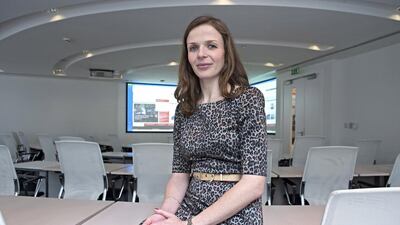Clare Astley has been training UAE students since 2009 in the art of “soft skills” such as communication, networking and delivering presentations. The London-based professional development manager at the Cass Business School of City University London was recently in Dubai to conduct workshops with Executive MBA students. Ms Astley says management graduates must improve such skills to secure that coveted first job.
What are the major skills new graduates here lack when it comes to landing their first job?
The MBA students are experienced and good at analytical skills, but all over the world they fail in interpersonal and communication skills. With MBA students there is an aspiration to become the next chief executive or set up their own business, so the real fundamental skill needed is networking. Because that is the number one way MBA students get their next role, even if you want a progress in your current organisation, or change the direction of the career or location. [This is] so that you can bypass the traditional HR departments, who are looking to hire people with exactly the same set of skills as yours. A lack of these skills is common everywhere. Here, people are a little more aware about it now and there has been a slight improvement but the challenges are the same. There is a fear of networking, and fear of failure, or being put in the spotlight.
What do soft skills include?
These are people skills, including communication, networking, presentation skills, influencing and persuading people and making a personal impact. That is, anything outside the academic world.
Apart from a degree, hard work and talent, how much importance do employers place on soft skills and why?
It is the most important skill, because you have to communicate clearly and persuasively during the job interviews. And then you have to negotiate with the clients.
What can be done to improve these skills or develop them?
Career planning is a three-step process: the first is about taking a step back and doing some self-reflection to give focus, clarity and direction to your story when interviewing for jobs or while networking. The second stage is research and the third implementation. Sign up for networking events, talk to the alumni and talk about an organisation’s current challenges and do your research before applying for a job. A top tip would be to talk to the person whose job you want and see how they got there. Practise, practise, practise.
Which sectors place high importance on soft skills among new graduates?
It’s important across all sectors. But if you are trying to set up your own business it is even more important because you are going to convince people [to like] your idea, and trying to get people to invest in your business, among others. These skills are not sector-specific. It is vital to communicate your message across all sectors.
How can graduates improve their networking skills?
Networking is important everywhere, but across the Gulf it’s the way business is done here. Moreover, it’s a life skill and it’s all about talking to people and building relationships. I think it is not always about knowing new people, it’s also about thinking about people already in your network. Think about your friends, family, lecturers, Facebook friends, football team, anything. It’s not about who you know but who you know and who they know. You have to know the right people and get them to trust you, because if they don’t they won’t introduce you to their network. Every time you meet people, ask for three more names they know who they can introduce you to at the end of your meeting. Moreover, our students typically have five to 15 years of work experience. Build on those relationships. But also put yourself out there.
ssahoo@thenational.ae

